- Home
- Elizabeth George
Careless in Red Page 14
Careless in Red Read online
Page 14
“What about sadomasochism?” Hannaford asked.
Lisle looked thoughtful, and Lynley said, “I’m not sure sadomasochists like being punched in the face.”
“Hmm. Yes,” Lisle said. “I’d think your common S and M freak would be looking to have himself tweaked round his privates. Spanked as well. Maybe whipped for good measure. And we’ve got nothing on the body consistent with that.” All three of them stood for a moment, staring at the chart of the skeletal system. Lisle finally said to Hannaford, “How’s the dating coming along? Internet made your dreams come true yet?”
“Daily,” she told him. “You must try it again, Gordie. You gave up far too soon.”
He shook his head. “I’m finished there. Case of looking for love in all the wrong places, if I might coin a phrase.” He gazed mournfully round the mortuary. “Puts them right off, this does, and no getting round it. No dolling it up. I spill the beans and there you have it.”
“What d’you mean?”
He gestured to the room. Another corpse was waiting nearby, a sheet covering its body, a tag on its toe. “When they learn what I do. No one fancies it much.”
Hannaford patted him on the shoulder. “Well, no matter there, Gordie. You fancy it and that’s what counts.”
“You want to give us a try, then?” He looked at her differently, assessing and weighing.
“Don’t tempt me, dear. You’re far too young, and anyway I’m a sinner at heart. I’ll need the paperwork on this”—using her chin to indicate the trolley that had been washed off—“as quickly as possible.”
“I’ll sweet-talk someone,” Lisle said.
They left him. Hannaford examined a hospital plan nearby and ushered Lynley to the cafeteria. He couldn’t think she intended to have a meal after their visit to the morgue, and he found he was correct in this assessment of matters. Hannaford paused in the doorway and looked round the room till she spied a man at a table alone, reading a newspaper. She led Lynley to him.
It was the man, Lynley saw, who’d come to Daidre Trahair’s cottage on the previous night, the same man who’d asked him about New Scotland Yard. He hadn’t been identified then, but Hannaford did the honours now. This was ACC Ray Hannaford from Middlemore, she told him. The assistant chief constable stood and courteously offered his hand.
“Yes,” DI Hannaford then said to Lynley.
“Yes?” Lynley asked.
“He’s a relation.”
“Former,” Ray Hannaford said. “Regrettably.”
“You flatter me, darling,” DI Hannaford said.
Neither of them elucidated further, although the word former spoke a volume or two. More than one cop in the immediate family, Lynley concluded. It couldn’t have been easy.
Ray Hannaford picked up a manila envelope that had been sitting on the table. “Here it is,” he said to his former wife. “Next time you insist on a courier, do tell them where you are for delivery, Beatrice.”
“I did tell them,” the DI replied. “Obviously, whoever the sod was who brought this down from London, he didn’t want the bother of going all the way to Holsworthy or the Casvelyn station. Or,” she asked shrewdly, “did you put in a call for this as well?” She gestured with the manila envelope.
“I didn’t,” he said. “But we’re going to have to talk about a quid pro quo. The account’s growing. The drive from Exeter was bloody murder. You owe me on two fronts now.”
“Two? What’s the other?”
“Fetching Pete last night. Without complaint, as I recall.”
“Did I drag you from the arms of a twenty-year-old?”
“I believe she was at least twenty-three.”
Bea Hannaford chuckled. She opened the envelope and peered inside. She said, “Ah yes. I take it you’ve had a look yourself, Ray?”
“Guilty as suspected.”
She brought the contents out. At once Lynley recognised his own police identification from New Scotland Yard.
He said, “I handed that in. It should have been…What do they do to those things when someone quits? They must destroy them.”
Ray Hannaford was the one who replied. “Apparently, they weren’t willing to destroy yours.”
“Premature was the word they used,” Bea Hannaford added. “A hasty decision made at a bad time.” She offered the Scotland Yard ID to Lynley.
He didn’t take it. Instead he said, “My identification is on its way from my home. I did tell you that. My wallet, along with everything in it, will be here by tomorrow. This”—he indicated his warrant card—“was unnecessary.”
“On the contrary,” DI Hannaford said, “it was entirely necessary. Phony IDs, as you well know, are as easy to get as the clap. For all I know, you’ve spent the morning scouring the streets for the goods.”
“Why would I want to do that?”
“I expect you can work that out for yourself, Superintendent Lynley. Or do you prefer the aristo title? And what the hell is someone like you doing working for the Bill?”
“I’m not,” he said. “Not any longer.”
“Tell that to the Yard. You didn’t answer. Which are you called? Which d’you prefer? Personal or professional title?”
“I prefer Thomas. And now that you know I am who I said I was last night—which I suspect you knew already or why else would you have allowed me into the mortuary with you—may I presume I’m free to resume my walk on the coast?”
“That’s the very last thing you may presume. You’re not going anywhere till I tell you otherwise. And if you’re thinking of scurrying off in the dark of night, think again. You’ve a usefulness now I have the proof you are who you claimed to be.”
“Usefulness as a policeman or as a private citizen?” Lynley asked her.
“As whatever works, Detective.”
“Works for what?”
“For our good doctor.”
“Who?”
“The vet. Dr. Trahair. You and I both know she’s lying through those pretty white teeth of hers. Your job is to find out why.”
“You can’t possibly require me—”
Hannaford’s mobile rang. She held up a hand and cut him off. She dug the phone from her bag and walked off a few paces, saying, “Tell me,” into the mobile as she flipped it open. She bent her head as she listened. She tapped her foot.
“She lives for this,” Ray Hannaford said. “She didn’t, at the beginning. But now, it’s what makes her alive. Foolish, isn’t it?”
“That death would make someone alive?”
“No. That I let her go. She wanted one thing; I wanted another.”
“That happens.”
“Not if I’d had my head on straight.”
Lynley looked at Hannaford. Earlier, he’d said regrettably about his status as the inspector’s former husband. “You could tell her,” Lynley said.
“Could and did. But sometimes when you demean yourself in another’s eyes, you can’t recover. I’d like to turn back time, though.”
“Yes,” Lynley said. “Wouldn’t we both.”
The DI returned to them then. Her jaw was set. She gestured with her mobile and said to the ACC, “It’s murder. Ray, I want that incident room in Casvelyn. I don’t care what you have to do to get it and I don’t care what the quid pro quo is going to be either. I want HOLMES set up, an MCIT in place, and an evidence officer assigned. All right?”
“You don’t ask for much, Beatrice, do you?”
“On the contrary, Raymond,” she replied levelly. “As you well know.”
“WE’LL SORT OUT A car for you,” Bea Hannaford said to Lynley. “You’re going to need one.”
They stood outside the entrance to Royal Cornwall Hospital. Ray had gone on his way, after telling Bea that he couldn’t promise her anything and after hearing her retort of “how true,” which she knew was an unfair dig but which she used anyway because she’d long ago learned that when it came to murder, the end of charging someone with a homicide justified any means one employed
to get there.
Lynley replied with what sounded to Bea like care. “I don’t believe you can ask this of me.”
“Because you outrank me? That’s not going to count for much out here in the hinterlands, Superintendent.”
“Acting, only.”
“What?”
“Acting superintendent. I was never promoted permanently. I was just stepping in to fill a need.”
“How good of you. The very sort of bloke I’m looking for. You can step in to fill another rather burning need now.” She felt him glance her way as they proceeded towards her car, and she laughed outright. “Not that need,” she said, “though I expect you offer a decent shag when a woman puts a gun to your head. How old are you?”
“The Yard didn’t tell you?”
“Humour me.”
“Thirty-eight.”
“Star sign?”
“What?”
“Gemini, Taurus, Virgo, what?”
“Is this somehow important?”
“As I said, humour me. Going along with the moment is so inexpensive, Thomas.”
He sighed. “Pisces, as it happens.”
“Well, there you have it. It would never work between us. Besides, I’m twenty years older than you and while I fancy them younger than myself, I don’t fancy them that young. So you’re entirely safe in my company.”
“Somehow that’s not a soothing thought.”
She laughed again and unlocked the car. They both climbed in, but she didn’t insert the ignition key at once. Instead, she looked at him seriously. “I need you to do this for me,” she told him. “She wants to protect you.”
“Who?”
“You know who. Dr. Trahair.”
“She hardly wants that. I broke into her house. She wants me around to pay for the damage. And I owe her money for the clothing.”
“Don’t be obtuse. She jumped to your defence earlier, and there’s a reason for that. She’s got a vulnerable spot. It may have to do with you. Or it may not. I don’t know where it is or why it is, but you’re going to find it.”
“Why?”
“Because you can. Because this is a murder investigation, and all the nice social rules fly out of the window when we start looking for a killer. And that’s something you know as well as I do.”
Lynley shook his head, but it seemed to Bea Hannaford that this movement wasn’t one of refusal so much as one that acknowledged a regretful understanding and acceptance of a single immutable fact: She had him by the short and curlies. If he did a runner, she’d fetch him back and he knew it.
He said at last, “Was the sling cut, then?”
“What?”
“The phone call you received. You came away from it calling the situation murder. So I’m wondering if the sling was cut or if they’ve dug up something else at forensics.”
Bea thought about whether to answer the question and what it would signal to him if she did so. She knew little enough about the man, but she also knew when a leap of faith was needed simply for what a leap of faith meant. She said, “It was cut.”
“Obviously so?”
“Microscopic examination helped push the decision—if you will—over the edge.”
“So not terribly obvious, at least to the naked eye. Why do you think it’s murder?”
“And not…what?”
“Suicide played out to look like an accident to spare the family additional pain.”
“What do we know so far that could possibly lead you there?”
“He was hit. Punched.”
“And…?”
“It’s stretching, but perhaps he wasn’t in a position to defend himself. He wanted to but couldn’t. Who knows why. He felt unable or at least unwilling, which resulted in a sense of uselessness. He projects that uselessness onto the rest of his life, onto all his relationships, no matter how illogical the projection is…”
“And Bob’s your mother’s you-know-what? I don’t think so and neither do you.” Bea shoved her car key into the ignition and thought about what these remarks suggested, not so much about the victim but about Thomas Lynley himself. She gave him a wary look and wondered if she’d been wrong in her assessment of him. “D’you know what a chock stone is?” she asked him.
He shook his head. “Should I? What is it?”
“It’s what makes this a murder investigation,” she said.
Chapter Seven
THE RAIN STOPPED IN CASVELYN NOT LONG AFTER MIDDAY, and for this Cadan Angarrack was grateful. He’d been painting radiators in the guest rooms of Adventures Unlimited since his arrival that morning, and the fumes were causing his head to pound. He couldn’t sort out why they had him painting radiators anyway. Who was going to notice them? Who ever noticed whether radiators were painted when they were in a hotel? No one except perhaps a hotel inspector and what did it amount to if a hotel inspector noticed a bit of rust in the ironwork? Nothing. Abso-bloody-lutely nothing. And anyway, it wasn’t like the decrepit Promontory King George Hotel was being taken back to its former glory, was it? It was merely being made habitable for the hordes interested in a holiday package on the sea that consisted of fun, frolic, food, and some kind of instruction in an outdoor activity. And that lot didn’t care where they stayed at night, as long as it was clean, served chips, and stayed within the budget.
So when the skies cleared, Cadan decided that a bit of fresh air was just the ticket. He would have a look at the crazy golf course, future location of the BMX trails, future site of the BMX lessons that Cadan was certain would be requested of him once he had a chance to show his stuff to…That was the problem of the moment. He wasn’t quite sure to whom he would be showing anything.
Indeed, he hadn’t been certain he was even supposed to come into work on this day, as he wasn’t sure that he had a job after what had happened to Santo. At first, he’d thought he simply wouldn’t show up. He thought he’d let a few days roll by and then he’d phone and express whatever condolences he could come up with and ask did they still want him to do maintenance work. But then he reckoned a phone call like that would give them a chance to sack him before he’d even had a chance to demonstrate how valuable he could be. So he’d decided to put in an appearance at the place and to look as doleful as possible round any Kerne he might run into.
Cadan hadn’t yet seen a hair of either Ben or Dellen—Santo Kerne’s parents—but his arrival had coincided with Alan Cheston’s and when Cadan brought Alan into the picture about his employment at Adventures Unlimited, Alan said he’d fetch someone at once to see what Cadan was meant to be doing. He’d strode off to do so, after unlocking the front door, letting them both in, and pocketing the keys with the air of a man who knew exactly where his place was in the scheme of things.
The old hotel was as silent as a graveyard. It was cold as well. Cadan shivered—he felt Pooh do likewise on his shoulder—and he waited in the new reception area, where a bulletin board displayed the words “Your Instructors,” along with head shots of the six staff members so far hired. These all pyramided down from a picture of Kerra Kerne, who was identified as “Director of Instruction.”
It was, Cadan thought, a decent picture of Kerra. She was no great beauty—ordinary brown hair, ordinary blue eyes, and stockier than Cadan fancied in a woman—but there was no doubt she was in the best physical condition of any female her age in Casvelyn. It was just unfortunate that her roll of the genetic dice had given Kerra her father’s looks instead of her mother’s. Santo had inherited every one of those, a fact which some might refer to as lucky. Cadan, however, reckoned most blokes didn’t fancy being pretty like Santo. Unless, naturally, one knew how to use it.
“Cade?”
He swung round. Pooh squawked and shifted position.
Kerra had materialized from somewhere. Alan was with her. Cadan knew they were a couple, but he couldn’t reconcile the matter. Kerra was sun and sinew with, unfortunately, tree-trunk ankles. Alan looked like someone who’d take exercise as a last resort a
nd then only if threatened with disembowelment.
A few words among them had sorted things. Although Alan on the surface might have looked like small change, it turned out he was on top of almost all that was going on at the place. So before Cadan knew enough to make a spurious excuse about the delicate condition of his lungs should they ever be exposed to paint fumes, he found himself with drop cloths and a paintbrush in one hand and two gallons of glossy white in the other. Alan made an introduction between Cadan and the project, and that was that.
Four hours later saw Cadan deciding he was owed a break outdoors. Pooh, he noted, had grown ominously silent. Likely the parrot had a headache as well.
The ground was still sopping round the crazy golf course, but Cadan didn’t let that deter him. Guiding his bike, he climbed the slope to hole number one, where he quickly saw that doing a few tabletops just now in this location had been something of a pipe dream. He set his bike to one side, established Pooh on the handlebars, and gave the crazy golf course a closer look.
This wasn’t going to be a simple project. The course looked at least sixty years old. It also looked like something that hadn’t been maintained in the last thirty of those years. This was too bad because otherwise crazy golf could have been a little moneymaker for Adventures Unlimited. On the other hand, this was also a plus because an unmaintained course made it far likelier than otherwise that anyone in the position of making a decision about the future would climb onboard once Cadan laid out his plans. But the idea of laying out plans necessitated having plans, and Cadan wasn’t a having-plans sort of person. So he walked round the first five holes of the course and tried to reckon what needed to be done aside from ripping out miniature windmills, barns, and schoolhouses and filling in the holes.
He was still considering all this when he saw a panda car pulling from St. Mevan Crescent into the car park of the old hotel. The driver—a uniformed constable—got out and went inside. A few minutes later he departed.

 Well-Schooled in Murder
Well-Schooled in Murder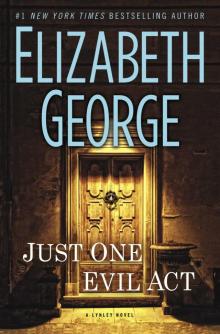 Just One Evil Act
Just One Evil Act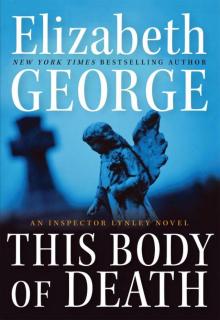 This Body of Death
This Body of Death The Edge of the Water
The Edge of the Water For the Sake of Elena
For the Sake of Elena Believing the Lie
Believing the Lie The Edge of the Shadows
The Edge of the Shadows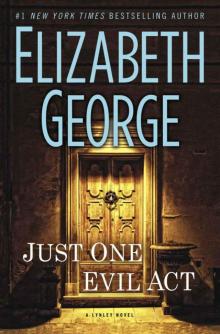 Just One Evil Act: A Lynley Novel
Just One Evil Act: A Lynley Novel In Pursuit of the Proper Sinner
In Pursuit of the Proper Sinner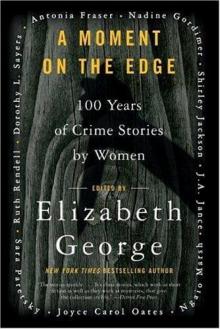 A Moment on the Edge:100 Years of Crime Stories by women
A Moment on the Edge:100 Years of Crime Stories by women Elizabeth I
Elizabeth I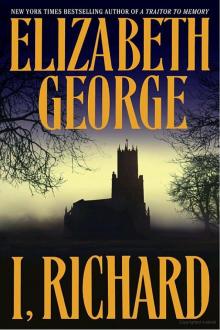 I, Richard
I, Richard A Traitor to Memory
A Traitor to Memory Missing Joseph
Missing Joseph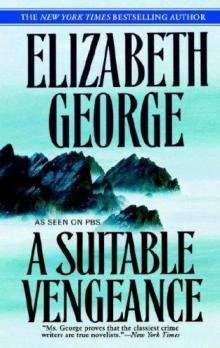 A Suitable Vengeance
A Suitable Vengeance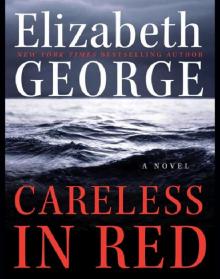 Careless in Red
Careless in Red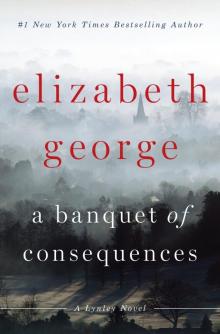 A Banquet of Consequences
A Banquet of Consequences Playing for the Ashes
Playing for the Ashes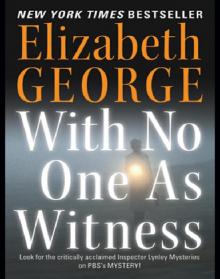 With No One As Witness
With No One As Witness Deception on His Mind
Deception on His Mind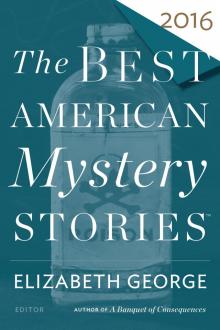 The Best American Mystery Stories 2016
The Best American Mystery Stories 2016 A Great Deliverance
A Great Deliverance In the Presence of the Enemy
In the Presence of the Enemy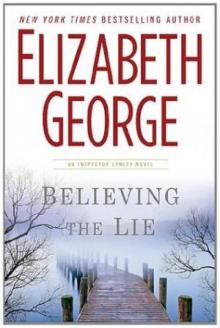 Believing the Lie il-17
Believing the Lie il-17 The Edge of the Light
The Edge of the Light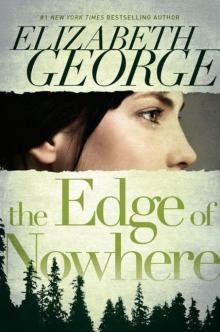 SW01 - The Edge of Nowhere
SW01 - The Edge of Nowhere A Place of Hiding
A Place of Hiding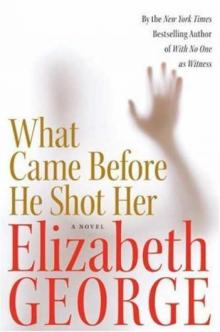 What Came Before He Shot Her il-14
What Came Before He Shot Her il-14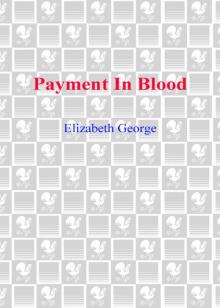 Payment In Blood
Payment In Blood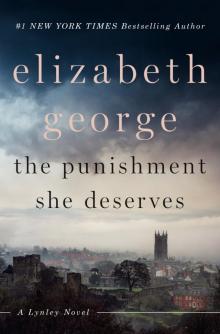 The Punishment She Deserves
The Punishment She Deserves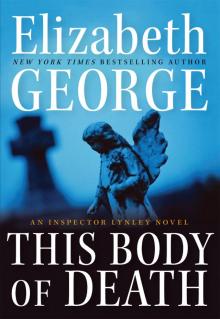 This Body of Death: An Inspector Lynley Novel
This Body of Death: An Inspector Lynley Novel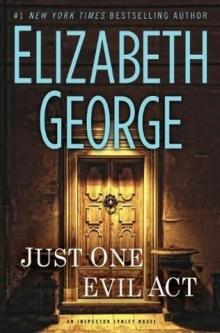 Just One Evil Act il-18
Just One Evil Act il-18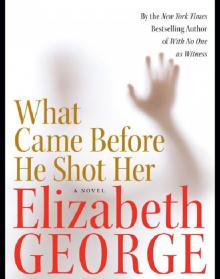 What Came Before He Shot Her
What Came Before He Shot Her Missing Joseph il-6
Missing Joseph il-6